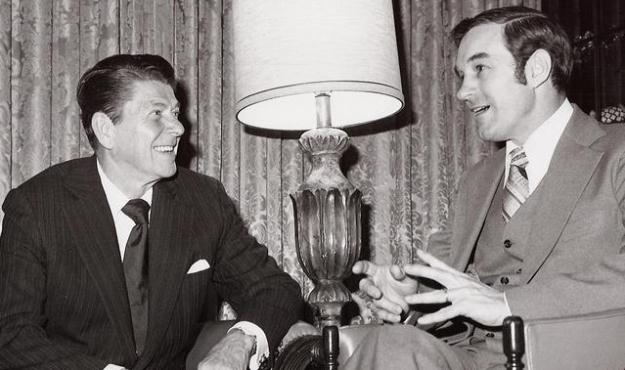[protected-iframe id=”882c375cd76eb8e137097b9faf432ede-46934866-60066902″ info=”//www.spreaker.com/embed/player/standard?autoplay=false&episode_id=5024321″ frameborder=”0″ scrolling=”no”]
Videos By Rare
For almost every controversial policy position GOP presidential candidate Ron Paul held that ruffled Republicans’ feathers, you could always find at least one major conservative figure who agreed with him.
Ron Paul believed the Iraq war was a mistake (as William F. Buckley eventually did and Jack Kemp did from the beginning); that the federal war on drugs was a failure (as did Buckley, Milton Friedman, and Reagan’s Secretary of State George Schultz); and even the theory that we encourage our enemies to attack us due to “blowback” from our foreign policy (a fear Russell Kirk expressed before The Heritage Foundation in 1991).
Three of the most important figures in the conservative pantheon—Ronald Reagan, Barry Goldwater, Bill Buckley—all identified with libertarianism and considered the philosophy integral to conservatism. “I believe the very heart and soul of conservatism is libertarianism,” said Reagan. In his book “Flying High,” a memoir about the 1964 presidential campaign, Buckley repeatedly refers to Goldwater’s philosophy as “libertarian” and his famous book “The Conscience of a Conservative” as a “libertarian tome.” Buckley referred to himself as a “libertarian journalist.”
If today, one of the greatest divides between libertarians and conservatives is supposedly foreign policy, that uber-traditionalist and famous despiser of libertarians Russell Kirk went out of his way to note that foreign policy is the one area where he and libertarians were in general agreement. Kirk praised libertarians in 1988 for trying “to exert some check upon vainglorious foreign policy,” adding “so far as the libertarians set their faces against a policy of American domination worldwide – why, I am with them.”
Indeed, the history of the modern conservative movement has largely been libertarians and traditionalists cohabitating the same space on the right, however uncomfortably or combatively.
So, when I read “Why the libertarian boom is bad for traditional conservatives” by the always-interesting Matt K. Lewis on Thursday, I was curious to know what he meant.
Focusing on growing acceptance of marijuana and gay marriage, Lewis writes:
If it’s true that the nation hasn’t gotten more liberal, just more libertarian, my fellow conservatives and I ought to celebrate, right? Wrong. Conservatism and libertarianism are not the same.
He’s right. Conservatism and libertarianism are not exactly the same. But neither are neoconservatism and traditional conservatism. Neither are aspects of social conservatism and limited government conservatism. Still, libertarianism, traditionalist conservatism and even the relatively newer neoconservatism all represent separate parts—some incompatible and even contradictory—of what most political observers would recognize as contemporary conservatism.
Lewis believes that libertarians don’t appreciate or understand the importance of cultural capital, arrived at and preserved through centuries of custom and tradition, and how that capital is what has allowed Western civilization to flourish. Perhaps, though I would argue that some libertarians might understand this better than others.
But one civilizational concern of most conservatives of most generations has been the growth of the state. It has always been the libertarian faction within the conservative movement that has been most focused on big government as the enemy of liberty.
Reagan’s three-legged stool of faith-based conservatives, national security conservatives and economic-libertarian conservatives may or may not be outdated. But during the Bush-Cheney administration, we did have the opportunity to see what the conservative movement might look like with its libertarian leg completely sawed off.
George W. Bush was, and probably will remain for the foreseeable future, a favorite president of national security conservatives and neoconservatives. Faith-based conservatives tend to remember the last Republican president fondly as well.
But for economic-libertarian conservatives whose primary concern is the size and scope of government, you couldn’t have asked for a worse president with the exception of the current White House occupant. Throw in a needless war that exacerbated our debt and gross abuse of civil liberties and the Constitution, and George W. Bush was arguably the most anti-libertarian president of modern times with the exception, again, of President Obama.
Libertarianism was simply not a part of conservatism as it existed from 2000 to about 2007, when the tea party movement and Ron Paul’s first presidential campaign began to re-inject limited government principles back into the Republican Party.
If Matt Lewis is saying that conservatives and libertarians are not the same based on how conservatism was defined from 2000-2007, he would be correct.
But to say that libertarianism is completely separate and distinct from conservatism is false. To say that libertarianism is bad for conservatism is most certainly false.
The libertarian principles, ideas and figures being debated right now are really the only thing that can return Republicans to being a traditionally conservative, limited government party again.

